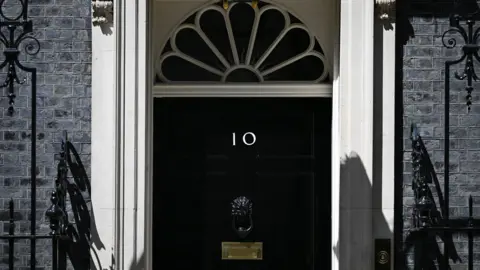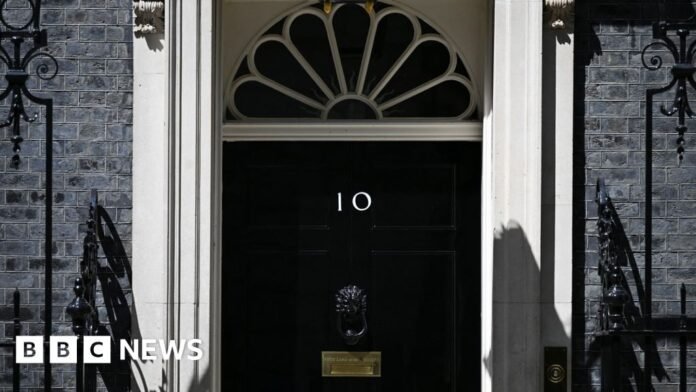Political correspondents
 Reuters
ReutersAngela Rayner has declared that the government will go ahead with its controversial legislation, aimed at reforming the welfare system, next week.
But a well-placed source told us it could still be pulled: “It’s a live discussion.”
Conversations are continuing at the heart of government on the least worst course of action in the face of a significant backbench rebellion.
More than 120 Labour backbenchers have signed an amendment calling for the proposals to be scrapped, making an embarrassing defeat for the government possible.
Ministers are exploring whether some potential rebels can be won over with concessions or whether it’s better to avoid next week’s vote entirely, and postpone until the autumn.
Sources suggest the Chancellor Rachel Reeves is “digging in”. They fear concessions, if any, would only be offered from the dispatch box on Tuesday if defeat looms.
But some in government believe this is seen as too much of a high-wire act, and don’t want to risk defeat.
Even if the reforms stumble through, one leading rebel predicted dire consequences.
The subsequent bitterness in Labour’s ranks, they suggested, would making it all but impossible for the leadership to handle their own parliamentary party.
Labour’s landslide election victory was just a year ago, so how could it now be even at the remotest risk of defeat on a flagship policy?
Here are a few factors.
Ignoring the signals
This rebellion has been a long time in gestation.
What ignited the flame of rebellion was the government’s own assessment in March that its welfare changes could force 250,000 people – including 50,000 children – into relative poverty.
This did not take in to account new measures to get more people in to work, because these have yet to be implemented, but that headline figure made many MPs shudder.
That the government had a problem with party management should have become obvious when backbenchers were called in to meet officials in Downing Street to be briefed on the welfare changes early in March.
Some of these usually loyal MPs emerged unhappy.
One of them told us: “People won’t wear it. The costs of being disabled aren’t going down. They can’t just force this through like the winter fuel cut.”
Another said they had made a “heartfelt” plea for a change of course.
Alarm bells should possibly have rung when welfare ministers – including Work and Pensions Secretary Liz Kendall – held a series of sessions with concerned backbenchers, and some of the testy exchanges were leaked.
The next milestone on the road to rebellion was in May when 42 Labour MPs wrote to the Guardian pushing for postponement of cuts and a rethink.
But the sirens should have wailed when more than 100 Labour MPs wrote to the government whips last month.
When only very small concessions – or “olive branches” as Department of Work and Pensions sources preferred to call them – emerged, discussions began behind the scenes among MPs on drawing up a ‘reasoned’ (at Westminster, this is a euphemism for ‘wrecking’) amendment – when dissenters would display their discontent in public.
One cabinet minister told the BBC: “Some of those who signed the amendment did so thinking that the Speaker wouldn’t select it, but that it would make the strength of feeling clear and bring the government to the negotiating table.”
But the government hasn’t sat down at that table and the cabinet minister believes that if next week’s welfare vote goes ahead, “the Speaker would be mad not to select it” – placing the government in danger of defeat.
Wrong way round
A chunk of blame is being apportioned to the chancellor’s fiscal rules – and to the chancellor herself.
Almost all Labour MPs believe a ‘broken’ welfare system needs to be fixed.
They like the £1bn of extra support that Kendall secured for measures such as one-to-one coaching to help unemployed people into work, and a ‘right to try a job’ without a subsequent loss of benefits if it doesn’t work out.
But the dissenting MPs wanted this approach to be used first, before most cuts to benefits took place, and they complain that too much of this funding is scheduled for later in the parliament, while the process of restricting Personal Independence Payments will begin in around 18 months.
As one rebel put it: “The welfare changes are the wrong way round.”
Rachel Reeves had promised to stick by her “iron clad” fiscal rules, which mean that debt has to be on a trajectory to fall as a share of national income on a five year horizon.
To help meet these, she pencilled in £5bn of welfare cuts.
While Kendall told the BBC that the welfare reforms didn’t start with a spreadsheet, many of her colleagues believe Reeves couldn’t make the same claim.
What MPs felt gave the game away was this: the chancellor found extra cuts at her Spring Statement in March, when the budget watchdog, the Office for Budgetary Responsibility, didn’t think the numbers added up.
Even some supporters of the reforms believe that the emotional case for them – getting people off the unemployment ‘scrapheap’, ending stressful re-assessments for the most vulnerable – were not made soon enough or forcefully enough.
One minister – who predicts the welfare vote will be postponed – suggested that the jobs of Kendall and the chief whip Sir Alan Campbell were on the line.
Asked if Reeves’s position could be at risk, the minister said: “Keir will do that in this parliament but it’s the last lever he will reach for. He’ll sack his advisers at least one more time before it comes to that.”
Rebel Alliance
Opposition to the welfare cuts is genuine and heartfelt among many of the Labour sceptics.
But there is an underlying environment that might make conditions ripe for rebellion.
Study the names of those calling for a rethink.
They include people with front bench experience in opposition who hoped or expected to become ministers – and were overlooked.
The names also include people who have direct experience of being on benefits, or of forming welfare policy, but who feel they weren’t given their due or properly consulted by the party leadership.
One of them told me: “Party management has been appalling right from the start. Holding meetings isn’t the same as listening – they have not listened to us. There has been a lot of frustration.”
This group of MPs would not have responded well to the prime minister’s description of the potential rebels as “noises off” at a press conference on Wednesday. He can expect more noise as a result.
Around half of those calling for changes are MPs elected for the first time in 2024.
Labour was supposed to have weeded out troublesome candidates, such as those close to the Jeremy Corbyn leadership, those with rebellious tendencies and dodgy social media histories.
Yet the prime minister is facing the biggest rebellion of his leadership.
Perhaps what wasn’t factored in by those around Sir Keir is that many of the new intake were brought into politics by protests about Conservative welfare policies. As one person involved in drawing up these reforms said, the welfare state is to Labour MPs what Europe was to Conservative MPs.
But according to one veteran MP – who has signalled her own willingness to rebel – some of her fresher colleagues are acting not just on behalf of disabled constituents but themselves.
They have been inundated with constituents’ complaints, they have small majorities and they want to distance themselves from unpopular policies.
Big majority, big problem?
Some of the difficulties the government faces may not have come despite the majority – but because of it.
There are only so many government jobs to go round. So MPs who believe they are never likely to become ministers are more open to acting independently. When whips or cabinet ministers warn colleagues that they may be killing off hope of a ministerial career if they rebel, the calculation may be that they are unlikely to receive preferment in any case.
And while big majorities look impregnable, many MPs aren’t feeling very secure. Labour secured lots of seats on a small share of the vote in 2024 – and the more Labour lags behind Reform UK in the polls, the more discipline diminishes.
As one minister put it: “This is the new reality of our volatile politics. Welcome to Italy.”
Some MPs also don’t seem to feel personal loyalty to Keir Starmer – they feel that it was the electorate’s desire for change rather than their party leadership that was responsible for their elevation to Westminster.
Some of them tell me they now feel embarrassed by promising during the election campaign that disabled benefits wouldn’t be cut – or accusing the Conservatives of considering withdrawing winter fuel payments when in fact it was their own party that subsequently did so.
Resentments have been simmering but now the political temperature is being turned up.
One new MP told us: “In the first month, it’s very difficult to stand up to your government and feel like you’ve got a voice, but I think in those intervening months that a lot of us have found that voice.
“We have found support amongst others. And we do feel confident in saying what we think is right and what is wrong.”
With a large majority, some backbenchers feel under-used. One MP observed that many welfare rebels had also thrown themselves actively into one side or the other of the assisted dying debate: “They got a taste for anger and organising” – including against fellow Labour MPs.
One U-turn deserves another
The U-turn on winter fuel – which many backbenchers welcomed – may also have convinced some potential rebels that if enough pressure is applied, the government will fold.
So far from buying off welfare rebels by that U-turn, they seem to have been emboldened.
The consequences of this are making some of their more loyal colleagues shudder. Bad blood is flowing between some backbenchers.
Some of the favoured sons and daughters (in some cases quite literally) of the party hierarchy were ushered in to winnable seats close to the general election by the party machine.
They didn’t have to engage in the jeopardy of a local selection battle.
The leadership expected loyalty in return but even a small number of them have baulked at the welfare reforms.
One critic bemoaned that they were “parachuted into their safe seats and have already forgotten how they got here”.
Another MP said: “I’m afraid it shows many in the party just aren’t fit for government.”
And one of the new intake doesn’t have much time for indiscipline, either.
He told us that he had learned his some of his colleagues were “spineless” and “treacherous”.
Warming to his theme, he feared the party was retreating to the comfort of its traditional vote-losing ways: “Classic Labour. A year into government and we’re already screwing it up.”








